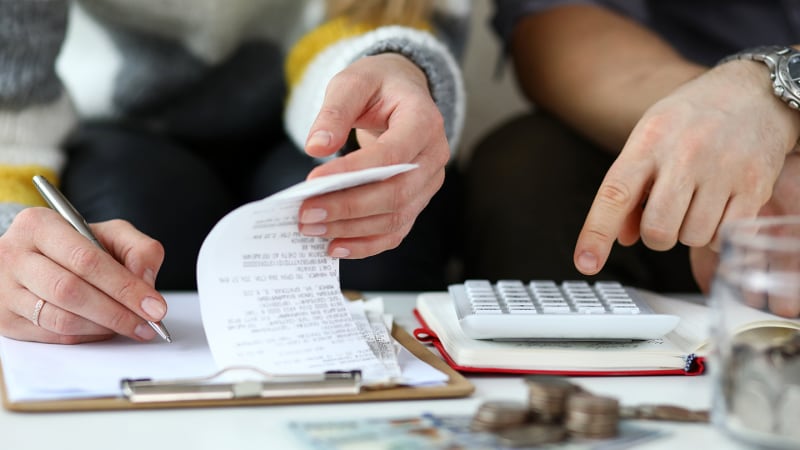Tips on how to manage your debt

Quick insights
- Managing debt effectively usually requires a strategic plan and a commitment to financial discipline. You may want to create a budget and prioritize paying off high-interest debts first.
- Debt can be a useful tool for many people when used responsibly. It can be crucial to weigh the pros and cons and borrow responsibly such as access to funds, leverage and high interest rates.
- Staying out of debt can require some level of discipline and smart financial habits. It might be beneficial to build an emergency fund, live within your means and avoid impulse spending.
Living with debt is more common than you think. Many people have some form of debt and want to make progress toward reducing their debt obligations. Becoming debt-free will most likely not happen overnight, but there are tactics and strategies that might help you increase your chances of paying off your debt. Let’s look at some of those tips to learn how you may be able to manage your debt.
Pros and cons of debt
There are a few reasons why you may want to consider paying off you debts. Some may include:
- Money availability: If you don’t have any more debts to account for in your budget, you may have more money to put toward other goals. This could be saving for retirement or a down payment on a house, or to finally go on that big trip you’ve always dreamed of.
- Emergency fund and investing: You may have the possibility of using that money for other areas of your budget such as contributing to your investments or an emergency fund. That way you’ll have more to fall back on if you’re faced with an expensive emergency or job loss.
- Less stress: There may be a psychological benefit to paying off your debt, too. The mental weight of debt can be heavy, and the stress can lead to mental, emotional and physical health issues.
You may be wondering if there are also disadvantages to debt-free living. As with all financial decisions, there are multiple sides to consider. Disadvantages may include:
- Credit impact: If you pay off all your debt and close your accounts, you may see your credit score take a negative hit. This is because credit history and payment behavior are important factors of your score. Overall, having open credit card accounts and paying them on time can be a healthy financial habit.
- Fewer opportunities: While living debt-free might be the preferred scenario, sometimes taking on debt can help you achieve life goals and dreams. For instance, most people likely can’t pay all-cash outright for a major purchase like car or a home. Financing helps make these milestone purchases more accessible.
While you’re working towards getting out of debt, do your best to avoid accruing debt in other areas. As you begin to tackle your debts and become more creditworthy, you may start to notice an increase in your purchasing power. You might feel tempted to make new, and maybe unnecessary, expenditures.
Strategies to pay off debt
If you’re wondering how to work towards managing and paying off your debt, there are several strategies to consider, including:
Avalanche or snowball methods
Two popular techniques when it comes to paying off debt are the debt avalanche method and the debt snowball method.
The avalanche method focuses on paying off your debt with the highest interest rate first, then moving on to the debt with the next-highest interest rate, and so on through all your debts. Of course, you’ll need to continue making minimum payments on all your debts, even while allocating extra resources toward your highest-interest debt.
The snowball method builds momentum by paying off your smallest debt balance, and then working your way up to the largest amounts. Again, you’ll still need to make all your minimum payments, even while focusing on the smallest debts.
Build a budget
Building a budget that prioritizes paying off debt will be important in regards to trying to become debt-free. Make sure you’re tracking your spending, so you know exactly how much you need for necessities, and how much you have left over. You can then choose however much of that leftover income you want to put toward paying off your debt. Remember to also budget a little cash for fun things, like the occasional meal out or going to a movie. It’s easier to stick to a budget when it works with your life rather than against it.
Put unexpected money toward debt
If you receive an unexpected sum of money, such as an inheritance or tax refund, consider putting that toward your debt. It can be tempting to use the extra money for something you’ve been wanting but allocating money to pay off your debt will save you interest in the long run.
Try a side hustle
Consider making use of your skills and interests to find a side hustle to make a little extra cash. This might be as simple as monetizing something you do anyway. For instance, if you go on a walk every day after work, you can sign up for a dog-walking app and make additional money. A side hustle doesn’t have to be a long-term plan — it may just be something you try out short-term to make a few extra payments.
Negotiate lower interest rates
Contact your credit card issuer to ask for a lower interest rate. Some credit card companies are willing to reduce rates for customers with a strong payment history, good credit score or long-standing account. Even a small reduction can save hundreds, or possibly thousands, of dollars in interest over time. This frees up more money to pay down your balances faster. To start, gather your account details, call your issuer and politely explain that you’re looking to lower your rate. If one issuer says no, you can try again later or reach out to another card issuer.
How to stay out of debt
Sometimes life throws you a curveball that makes avoiding debt impossible. But there are some things you can do to reduce your reliance on borrowing.
- Have an emergency fund: Having some money to cover emergencies such as an unexpected car repair or veterinary bill may help you avoid accruing debt.
- Get insured: Make sure you understand the different insurance policies available such as homeowners, car and medical insurance. It may be worth paying a little more each month to have a better policy in place to protect you against expensive costs.
- Stick to your budget: Re-evaluate your budget every 3-4 months and see what tweaks you can make to increase your savings.
- Use autopay: You can still use credit cards, but you must not forget to pay your balance on time. Set up automatic payments to pay the balance in full and on time every single month to help avoid credit card debt.
In summary
Having a clear goal and motivation can help keep you on track to paying off debt. There are many strategies and tools available that work best for your financial situation and lifestyle. With intentional planning and patience, you can manage your debt in a way that works for you.



